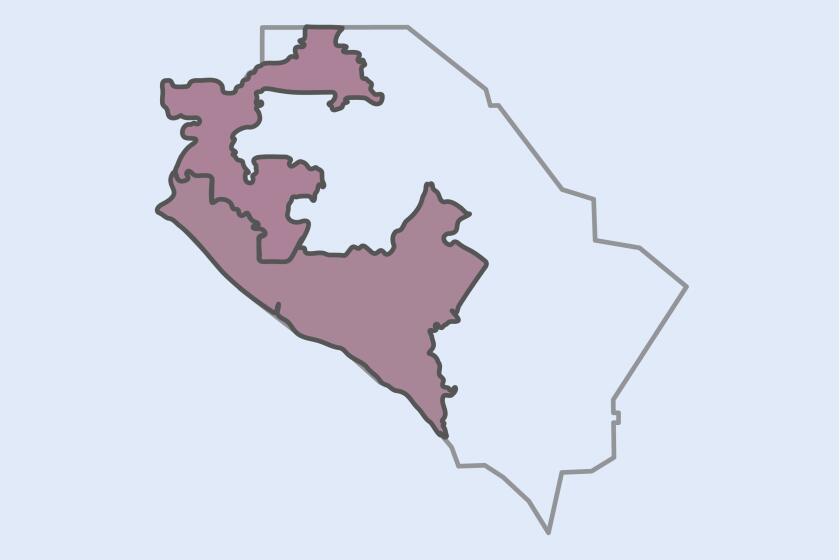Democrat Dave Min wins seat held by Katie Porter representing coastal Orange County

Democratic state Sen. Dave Min won an open congressional seat in coastal Orange County, defeating Republican business owner Scott Baugh despite recent gains in GOP voter registration.
California’s 47th Congressional District is one of the most competitive races in the country and was seen by both parties as crucial in their attempts to control the House. Min’s victory means Democrats will retain a seat they currently hold, but it may not be enough for them to win the majority. As of Tuesday night, Republicans were two seats away from winning the House.
Baugh conceded the race Tuesday with a statement to supporters.

“I was looking forward to working with Democrats, Republicans and @therealdonaldtrump to solve serious problems like an open border, increasing crime, and runaway federal spending but the voters have spoken and this is not what is intended for me,” Baugh wrote.
Min said he will head to the nation’s Capitol “with eyes wide open.”
“We are facing the struggle of our lives to try to defend this country and its most cherished legacies and democratic institutions,” Min said in a statement.
“I will continue to stand up for our rights, including the reproductive rights of women, and to fight for a stronger and better future for young people, including creating more affordable housing, reducing gun violence, and doing all we can to rescue our civilization from the climate crisis. The fight has just begun.”
California’s 47th Congressional District is currently held by Democratic Rep. Katie Porter, who will be leaving Congress in January. Her decision not to seek reelection and to instead run for the U.S. Senate, a bid that fell short in the March primary, kicked off a passionate competition to replace her. Porter narrowly beat back a challenge by Baugh in 2022.
The future of the seat hinged on a razor thin margin in the days after election day. At one point, only 600 votes separated the two candidates.
Rep. Michelle Steel, Derek Tran and State Sen. Dave Min are all counting on the key Asian voting bloc—congressional district 45 and 47 are roughly 30% Asian—to win in November. These maps show where in conservative Orange County their support lies.
Democrats for years had a slight voter registration advantage over Republicans in this affluent coastal district, which includes Costa Mesa, Huntington Beach, Irvine, Newport Beach and Seal Beach.
But GOP registration gains flipped that advantage this cycle. Registered Republican voters outnumbered registered Democrats by 383 people as of late October, according to the Orange County Registrar of Voters.
Still, the Cook Political Report, which tracks House races, listed the 47th District as leaning Democratic. The Democratic Congressional Campaign Committee included the race — considered a key win for Democrats hoping to regain control of the House — on its “red to blue” list. The race was such a priority for Democrats that former President Clinton came to Orange County last month to campaign for Min.

Min, a former UC Irvine law professor, has served in the state Senate since 2020. During his congressional campaign, Min emphasized his desire to codify Roe vs. Wade and other legislation at the federal level that he says would protect the rights of women to make their own healthcare decisions. He’s also advocated for gun violence prevention during his campaign, pointing to legislation he was author of that banned gun shows on state property.
Min broke from party leadership, including Gov. Gavin Newsom, over the summer when he publicly supported Proposition 36, a controversial anti-crime measure that will increase penalties for certain theft and drug offenses. California voters have overwhelmingly approved the measure.
Crime has become a key issue in the race between Republican Scott Baugh and Democratic Sen. Dave Min. The 47th Congressional District, which includes Irvine, Newport Beach, Costa Mesa, Laguna Beach and Huntington Beach, is one of several close races that could determine control of Congress.
Min has faced a barrage of attacks related to his DUI arrest last year and last month had his campaign signs defaced with anti-Asian slurs.
Baugh, a Huntington Beach attorney, led the Orange County GOP as its chairman from 2004 to 2015 and served in the California Assembly from 1995 to 2000. Baugh centered much of his campaign on border security, inflation and public safety.

In a television advertisement, Baugh shared about his younger brother’s death from fentanyl in 2020 and emphasized that his first priority in Congress would be to address the fentanyl epidemic. Baugh has faced attacks from Democrats for allegations of misconduct in his 1995 election to the Assembly and his opposition to abortion.
Min raised nearly $6 million for his campaign, while Baugh brought in more than $3.6 million. Significant outside spending was pumped into the race, with political action committees contributing $4.4 million to support Min and $1.3 million in support of Baugh, according to Federal Election Commission filings.
Outside groups also spent millions opposing the candidates. The Democratic-aligned House Majority PAC and the conservative United Democracy Project and Club for Growth Action were among the top spenders.
All the latest on Orange County from Orange County.
Get our free TimesOC newsletter.
You may occasionally receive promotional content from the Daily Pilot.






